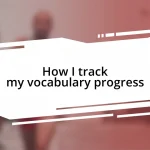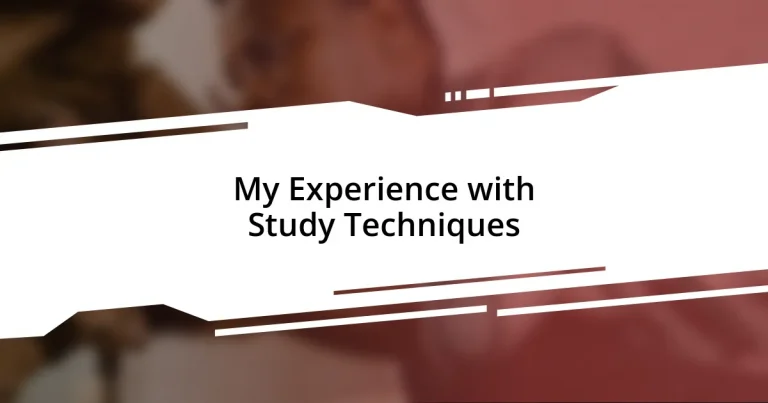Key takeaways:
- Discovery of the Pomodoro Technique significantly enhanced productivity by breaking study time into short, focused intervals.
- Active recall using flashcards transformed studying from memorization to genuine understanding of material.
- Mind mapping provided clarity by visually organizing thoughts and creating connections between ideas.
- Regular evaluation of study techniques and sharing progress with peers fostered accountability and motivation.
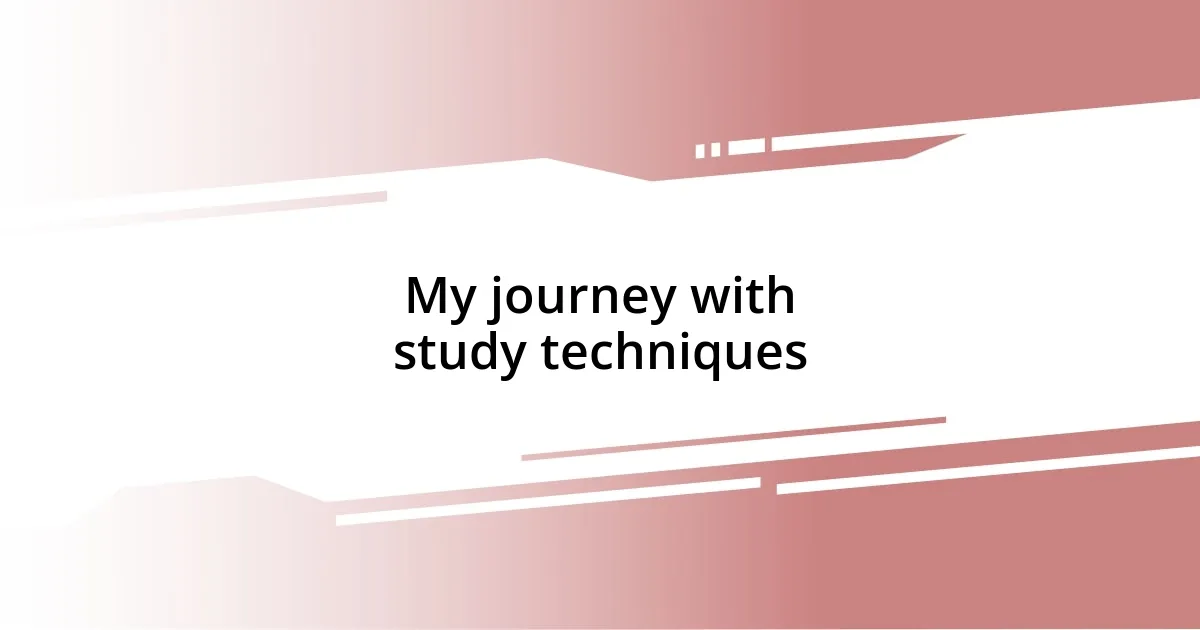
My journey with study techniques
I still remember my first encounter with the Pomodoro Technique. I was so overwhelmed with the sheer volume of material I had to learn for my exams that I felt paralyzed. When I decided to give it a shot, breaking my study time into short bursts with breaks in between, it was like a lightbulb moment! Who knew that a little timer could transform my productivity like that?
During one particularly strenuous semester, I stumbled across the idea of active recall. I found myself struggling to retain complex concepts in my biology class, and a friend suggested I quiz myself using flashcards. At first, it felt tedious, but as I continued testing myself, I realized I was not just memorizing; I was truly understanding the material. It made me wonder—how many other study methods could unlock this level of comprehension?
Reflecting on my journey, I also experimented with mind mapping. Initially, it sounded a bit silly to me, doodling and drawing lines between ideas. However, as I visually organized my thoughts, I felt a sense of clarity washing over me. Have you ever had that “aha!” moment when everything just clicks? That’s precisely what mind mapping did for me, turning chaotic thoughts into a structured roadmap of knowledge.
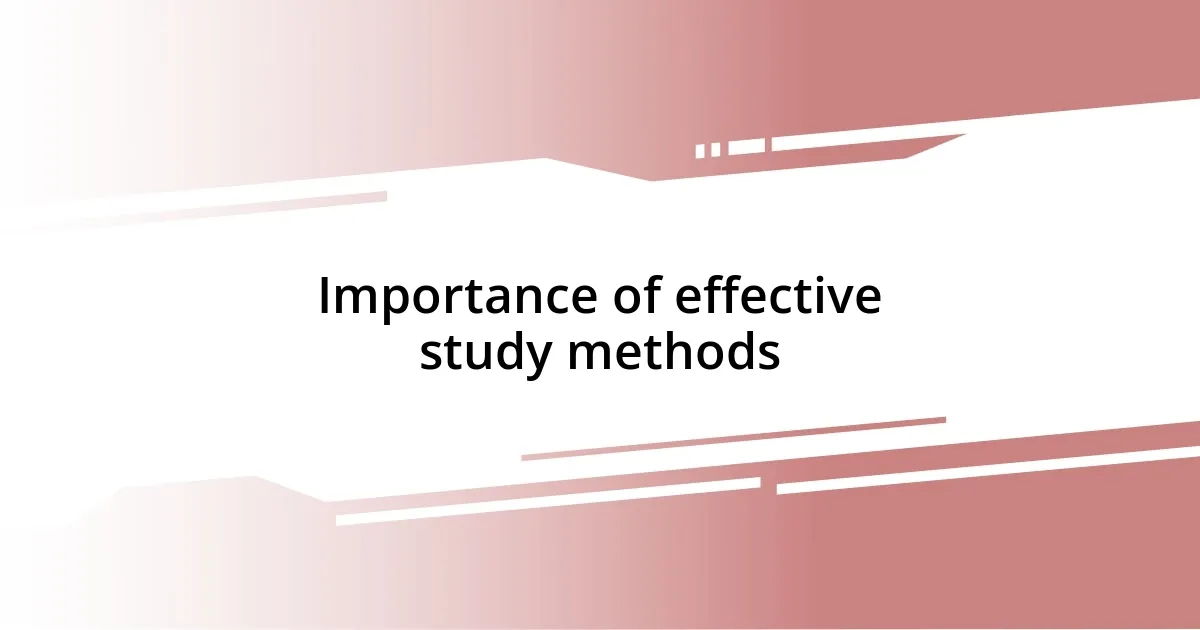
Importance of effective study methods
Effective study methods can make a world of difference in how we absorb and retain information. When I think back to my university days, I can’t help but recall the countless hours spent staring at pages, hoping somehow it would all stick. I realized that without a solid study strategy, all that effort was often in vain. Discovering potent study techniques not only improved my grades but also reduced my stress levels. I felt more in control, and that sense of empowerment was invaluable.
Here’s a quick rundown of why effective study methods are essential:
- Improved Retention: Techniques like spaced repetition allowed me to remember material long-term rather than cramming at the last minute.
- Increased Focus: Using methods like the Pomodoro Technique, I learned to concentrate better and avoid distractions during study sessions.
- Time Management: Structuring my study time strategically meant I could cover more ground without feeling overwhelmed.
- Deeper Understanding: Active recall transformed my approach; I wasn’t just memorizing facts, but genuinely engaging with the content.
- Motivation Boost: Seeing myself improve over time kept me motivated and excited to learn, rather than seeing studying as a chore.
Incorporating these techniques into my routine reshaped my academic experience, making it more productive and enjoyable.
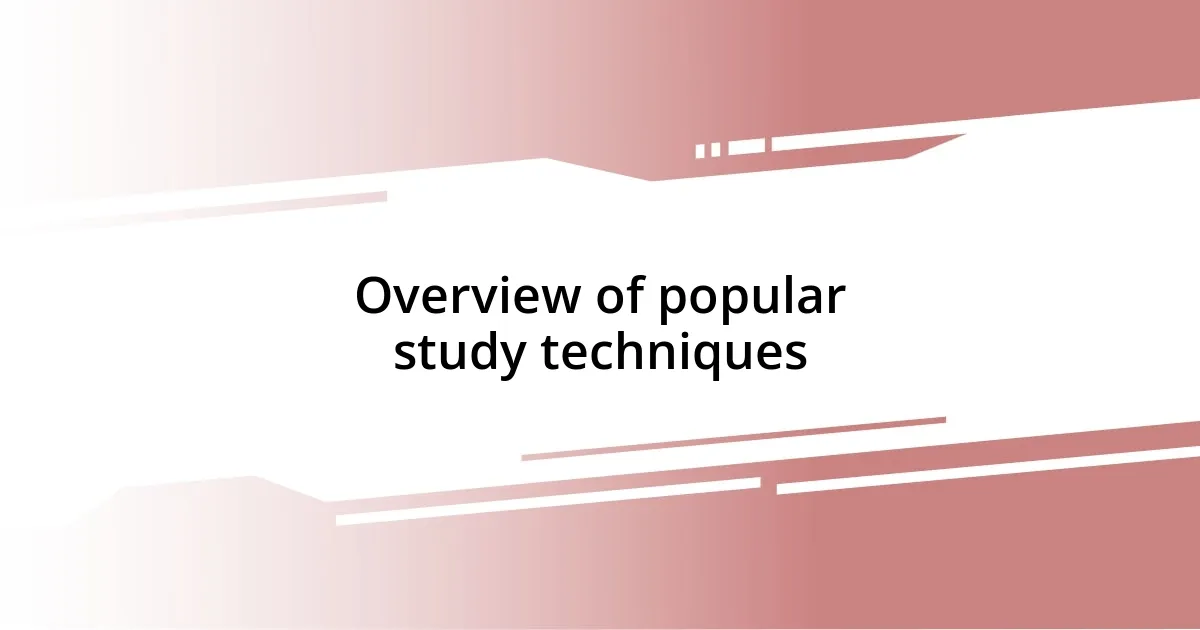
Overview of popular study techniques
The landscape of study techniques is vast, with each method catering to different learning styles. For instance, the Feynman Technique—my personal favorite—is all about simplification. I remember sitting down to explain complex concepts in the simplest terms as if I were teaching someone else. This not only reinforced my understanding but also highlighted gaps in my knowledge. Whenever I felt stuck, breaking down material this way felt like having a conversation with my brain that made things clearer.
Another technique that piqued my interest was visual learning. When I started using diagrams alongside my notes, it was surprising to see how much more connected I felt to the material. I often found myself doodling key points, and assembling graphs that represented my thoughts. That imagery made the information stick more firmly in my mind. Have you ever found the perfect visual that made everything click? For me, it was an eye-opening realization that not all information needs to be linear—sometimes, a little creativity can work wonders.
One cannot overlook the power of group study sessions, either. Combining minds often leads to breakthroughs, and I recall gathering with classmates in cozy cafes, discussing topics that had once seemed inscrutable. Each discussion uncovered new perspectives and clarified my understanding even further. Engaging in dialogue with peers added layers to the material, and that never-fading camaraderie made studying far less daunting.
| Study Technique | Description |
|---|---|
| Pomodoro Technique | Work in short bursts with breaks between sessions for enhanced focus. |
| Active Recall | Test yourself repeatedly to strengthen memory and understanding. |
| Mind Mapping | Visualize information to create connections and organize thoughts. |
| Feynman Technique | Teach or explain concepts in simple terms to ensure comprehension. |
| Group Study | Collaborate with peers to gain new insights and clarify confusion. |
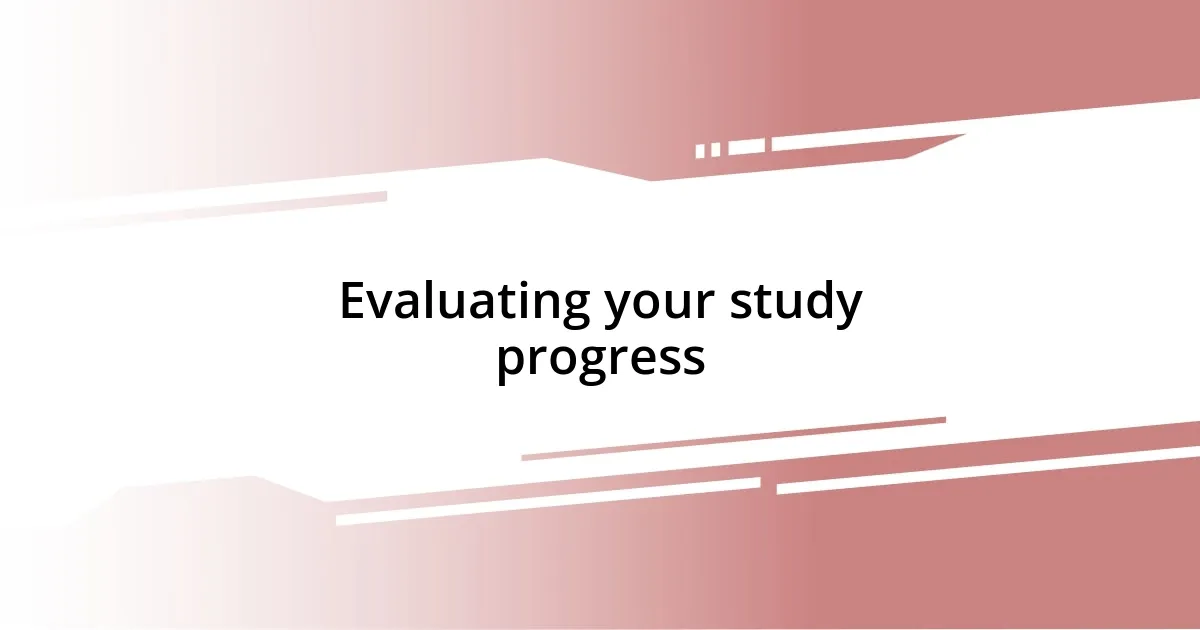
Evaluating your study progress
Evaluating your study progress is a crucial step in refining your techniques and ensuring that you’re on the right path towards achieving your goals. I remember one particularly intense week of studying for exams. I took a moment to reflect on what was working and what wasn’t. It was enlightening—some strategies, like the Pomodoro Technique, felt natural and productive, while others just didn’t resonate with me. Realizing that was a turning point; I started to fine-tune my methods based on this self-assessment.
Have you ever felt like you’re putting in tons of effort but not seeing the results you hoped for? I certainly have. It was during these moments that I learned the value of tracking my progress. I started using simple metrics, like how many chapters I could cover in a week or how well I performed on practice quizzes. This not only provided concrete evidence of my improvement but also boosted my confidence. It became clear that evaluating my study habits was less about perfection and more about progress.
As I continued this journey, I discovered that sharing my progress with friends created a sense of accountability. I remember a chat I had with a study buddy, where we celebrated our little victories, like mastering a tough subject. That dialogue helped me not only stay motivated but also recalibrate my strategies together. Reflecting on progress and discussing it with others made studying a shared experience rather than a solitary grind. What about you? Have you found that talking about your study goals helps keep you on track? For me, it turned learning into a collaborative adventure, making the process enjoyable and meaningful.










